

Data center: cos'è, come funziona, classificazione, vantaggi. There’s another story to tell about climate change. And it starts with water. Mystical Trance by Anugama - Demo 95 kbps Audio. Life lessons from Fungi – Home Edgeucated. (With thanks to fungi of all shapes and sizes, everywhere and Alan Rayner.)

Degrowth: A Call for Radical Abundance — Jason Hickel. In other words, the birth of capitalism required the creation of scarcity.
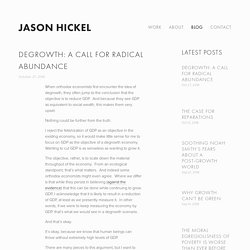
The constant creation of scarcity is the engine of the juggernaut. The same process unfolded around the world during European colonization. In South Africa, colonizers faced what they called “The Labour Question”: How do we get Africans to work in our mines and on our plantations for paltry wages? At the time, Africans were quite content with their subsistence lifestyles, where they had all the land and the water and the livestock they needed to thrive, and showed no inclination to do back-breaking work in European mines. The solution? Scarcity is the engine of capitalist expansion. And, crucially, the scarcity was artificially created. The End of Growth.
The world’s weird self-organizing economy. Why is it so difficult to make accurate long-term economic forecasts for the world economy?
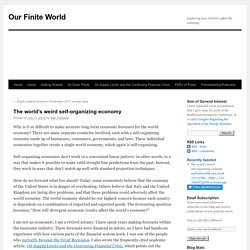
There are many separate countries involved, each with a self-organizing economy made up of businesses, consumers, governments, and laws. These individual economies together create a single world economy, which again is self-organizing. Conservativism Now? Market Economies and the Liberal Anti-Culture - Resilience. Conservativism Now? Market Economies and the Liberal Anti-Culture - Resilience.
Film in the Anthropocene. Facing The (Horrible) Future. Limites à la croissance, Anthropocène & Effondrement : Introduction à la collapsologie – Journal d'un jeune écologiste. J’ai eu l’occasion de présenter un exposé sur les « limites à la croissance » et l’effondrement, dans le cadre de mon cours de biologie, à ma vingtaine de camarades de classe, âgés de 16 à 18 ans.
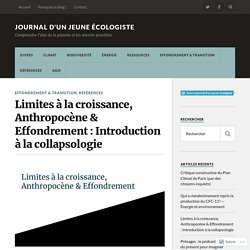
J’en ai conclus que les élèves étaient très réceptifs au sujet, et qu’il était nécessaire de présenter un constat clair et cohérent de la situation de la planète. Il faut parler vrai, ne pas proposer une vision optimiste ou pessimiste, positive ou négative, mais poser un constat lucide pour engager une prise de conscience profonde et non superficielle. C’est d’après moi la seule manière d’engager la transition chez un maximum de gens.
Voici le texte et les diapositives de mon exposé. N’hésitez pas à partager cet article dans vos réseaux, à vos proches, collègues, camarades de classe, ou même d’utiliser mon powerpoint pour créer votre propre présentation ! La capacité de charge des écosystèmes : le plafond de la croissance, ou le seuil, la limite à ne pas franchir. Vanessa Andreotti on imagination and how our dreams are tamed – Rob Hopkins. I recently taught at Schumacher College, and spoke about the work I am doing about imagination.

Afterwards, a few students came up to me and said “you must speak to Vanessa Andreotti“! She had, earlier that week, Skyped into the class, and presented her thinking about imagination, among other things. So I tracked her down and got in touch, and we had the following fascinating conversation. Vanessa is a Professor, and is the Canada Research Chair in Race, Inequalities and Global Change at the University of British Columbia. She has a particular interest in education for, and about, international development, in global citizenship education, in global justice and in the ethics of internationalization. Time To Choose. Vanessa Andreotti on imagination and how our dreams are tamed – Rob Hopkins.
22 Billion Energy Slaves: Mental Capital: Not Losing your Marbles. Do you ever get the feeling that society is losing its marbles?

Have some of your friends gone mad and can now only talk stridently about transgender bathrooms, Brexit and the latest presidential Tweet? Do you want to avoid the same fate? Consciousness of Sheep. Every now and again someone poses a question so obvious that you wonder why nobody asked it before.
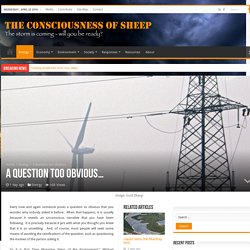
When that happens, it is usually because it reveals an unconscious narrative that you have been following. It is precisely because it jars with what you thought you knew that it is so unsettling. And, of course, most people will seek some means of avoiding the ramifications of the question; such as questioning the motives of the person asking it. So it is that Time Magazine “Hero of the Environment,” Michael Shellenberger poses just such an apparently innocuous question: Cursed to Live in Interesting Times. Museletter 311: The End of Growth, Seven Years Later - Richard Heinberg. MuseLetter #311 / April 2017 by Richard Heinberg Download printable PDF version here (PDF, 125 KB) The End of Growth, Seven Years Later I wrote The End of Growth in the months following the Global Financial Crisis of 2007-2008 (the book was published in North America in 2011), with the goal of helping to put that crisis in proper perspective.
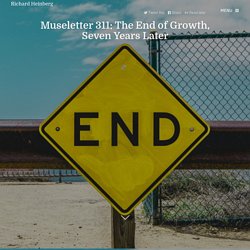
Hope and mourning in the Anthropocene: Understanding ecological grief. We are living in a time of extraordinary ecological loss.
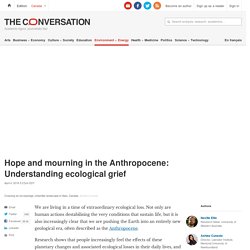
Not only are human actions destabilising the very conditions that sustain life, but it is also increasingly clear that we are pushing the Earth into an entirely new geological era, often described as the Anthropocene. Research shows that people increasingly feel the effects of these planetary changes and associated ecological losses in their daily lives, and that these changes present significant direct and indirect threats to mental health and well-being. Climate change, and the associated impacts to land and environment, for example, have recently been linked to a range of negative mental health impacts, including depression, suicidal ideation, post-traumatic stress, as well as feelings of anger, hopelessness, distress, and despair. We believe ecological grief is a natural, though overlooked, response to ecological loss, and one that is likely to affect more of us into the future.
The End of Growth, Seven Years Later. Better Technology Isn’t The Solution To Ecological Collapse. Review: Energy Return on Investment by Charles A. S. Hall. Love And Loss In The Anthropocene. Better Technology Isn’t The Solution To Ecological Collapse. The ecological singularity - L'Univers passe. The technological singularity, chronological scale by Ray Kurzveil The technological singularity is a concept which came into being in the mid-20th century.
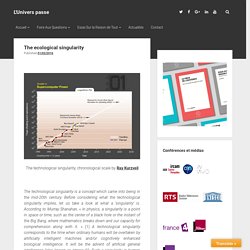
Culture Shift: Redirecting Humanity’s Path to a Flourishing Future. Our Economy is a Degenerative System - Resilience. Shale Bubble. The Food Explorer. Cue up the marching band, majorettes, flag-waving veterans, and cheering crowds. The Food Explorer by Daniel Stone is a proud celebration of American greatness.
The hero of the story is David Fairchild (1869–1954), a botanist and agricultural explorer. Working for the U.S. Film in the Anthropocene. Half-Earth: Our Planet’s Fight for Life by Edward O Wilson – review. In 2000, workers finished construction of a hydropower plant in Tanzania’s Udzungwa mountains. A giant reservoir was created by damming 90% of the water that had previously poured into nearby Kihansi gorge. Eric Holthaus on imagination: “Our brains are constantly being encouraged to give up” – Rob Hopkins.
Eric Holthaus was once called ‘The Rebel Nerd of Meteorology’ by Rolling Stone magazine and is a journalist who writes about climate change. In 2013, sitting at an airport, he burst into tears having just read the latest IPCC report, and took to Twitter to share the impact, as a scientist studying climate change, that this knowledge was having on him emotionally. Degrowth: A vocabulary for a new era - Degrowth. La permaculture, une vision des sociétés de demain – Journal d'un jeune écologiste. La permaculture, c’est une philosophie née dans les années 70 en Australie, dont les pères fondateurs sont le biologiste Bill Mollison et son élève David Holmgren, et remise sous le feu des projecteurs avec le mouvement de la Transition.
De l’expression anglaise « permanent agriculture« , elle est une méthode systémique et globale qui vise à concevoir des systèmes (habitats humains ou systèmes agricoles par exemple) en s’inspirant de la nature. La permaculture se base d’abord sur l’observation des écosystèmes naturels, et peut s’appliquer à la fois à des sociétés humaines et à des paysages, pour les rendre plus productifs, plus esthétiques, tout en permettant de fournir moins d’énergie et de travail. L’éthique de la permaculture L’éthique, ce sont les principes moraux qui guident nos actions vers le bon et le bien, et nous éloignent du mauvais et du mal. La permaculture a ses propres principes éthiques, à comprendre et à respecter avant d’attraper sa bêche… Des principes universels. Transparency Canada: Four pillars of Sustainable Economy. The four pillars of sustainable economy background: We believe the world is going to hell in a hand basket: - overpopulation, - peak oil and resource depletion (with the threat of water and resource wars on the near horizon), - climate change (and its almost undefinable potential for socio-political chaos), etc..
Effondrement ou autre futur ? Entretien avec Pablo Servigne. Tout va bientôt s’effondrer… mais nul besoin de paniquer : tel est, en substance, le message porté par Pablo Servigne et Raphaël Stevens dans leur Petit manuel de collapsologie à l’usage des générations présentes paru il y a bientôt trois ans dans la collection « Anthropocène » des éditions du Seuil. Chercheur indépendant (ou « in-terre-dépendant »), Pablo Servigne a, depuis, poursuivi son travail. Sarah Kilani revient avec lui sur un livre qui, malgré tout, fait quand même un peu froid dans le dos, tout en prolongeant la discussion vers d’autres voies.
Contretemps : Malgré la critique de la croissance que vous émettez dans Comment tout peut s’effondrer[1], vous ne citez que très peu le système économico-politique qui la sous-tend : le capitalisme. Understanding collapse - Stockholm Resilience Centre. Global Rich List. The Curse of Energy Efficiency. ‘Weaving’ — 21st Century Servant Leadership for Systemic Health. Psmag. Psmag. Situational Assessment 2018: the Calm Before the Storm. This series began in 2015 with an effort to do a broad assessment of the various risks present in the total global environment. Last year (almost precisely 365 days ago), I focused specifically on the political situation in the United States and outlined what I considered to be the essential fronts of a new and important kind of war:
As Climate Changes, We Need the Arts More than Ever. Stepping Back from the Brink. The Peace Fallacy. Cassandra's Legacy: Delusions of Grandeur in Building a Low-Carbon Future. Some excerpts from Carey King's excellent paper titled "Delusion of Grandeur in building a low-carbon future" (2016). Delusions of grandeur in building a low-carbon future. The River - A Deep Ecology Visual Poem. Deconstructing Transition. Is this the end of civilisation? We could take a different path. Problem loading page. Imgur: The magic of the Internet. 22 Billion Energy Slaves: Hard Goods. Global Temperature in 2017 — Climate Science, Awareness and Solutions, Inc.
Post Index. Dude, you broke the future! Tiny individual decisions really could help avert climate chaos. Is everything you think you know about depression wrong? The Myth of Drug Expiration Dates. Sustainability. The Impending Curtailment of Conventional Oil and the Total Resource Curtailment. Quelques liens et références pour découvrir la collapsologie – Journal d'un jeune écologiste. Design for Disposability – Disruptive Design. The Collapse of Global Civilization Has Begun – David B Lauterwasser.
Inside the new economic science of capitalism’s slow-burn energy collapse. The Dirty Secret of the Global Plan to Avert Climate Disaster. Post-Carbon Music. We Can’t Keep Eating Like This. The Unseen World. Peak Oil News and Message Boards Neoliberalism – the ideology at the root of all our problems. 9. ORGANIC GROWTH CITIES - Trends Research Institute. Dark Ecology. SunWeb: Earth Gifts 2. SunWeb: Earth Gifts 1. AI Has Already Taken Over. It’s Called the Corporation. What Will It Really Take to Avoid Collapse? Limits to Economic Growth. Why Branko Milanovic is Wrong about De-Growth.
Digital mass persuasion via psychological targeting. Deconstructing Transition. On Transition (!) Switzerland is Prepared for Civilizational Collapse. Confrères Journalistes bordel, réveillez vous ! – Clément MONTFORT. Mass starvation is humanity’s fate if we keep flogging the land to death. Bill McKibben: Winning Slowly Is the Same as Losing. Rising Methane Levels A Bigger Threat Than CO2 - Below 2C. Seven charts that explain the plastic pollution problem. What permaculture isn’t — and is. Worst-case global warming predictions are the most accurate, say climate experts. Meditations On Moloch.
You're Just Not Prepared For What’s Coming. What Should I Do? Transition 2017 - 4/4 : Éléments pour un programme et une éthique de transition. Everything Must Go. Too right it's Black Friday: our relentless consumption is trashing the planet. ¿Quién nos alimentará? 22 Billion Energy Slaves: Staying Afloat: Financial Capital.